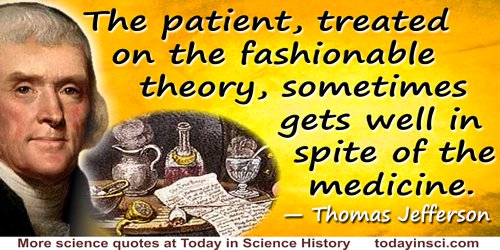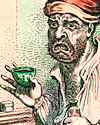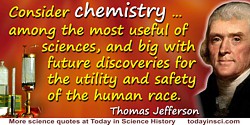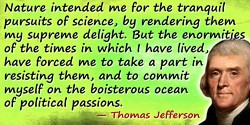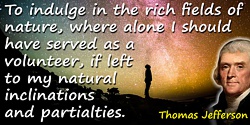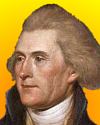 (source)
(source)
|
Thomas Jefferson
(13 Apr 1743 - 4 Jul 1826)
American statesman, astronomer, scholar and inventor who wrote the Declaration of Independence (1776) and organized the Lewis and Clark expedition (1803). His only full-length book, Notes on the State of Virginia contains an outline of the geography, flora and fauna of Virginia, and established his reputation as a scholar and a pioneering American scientist.
|
Thomas Jefferson
“The patient … sometimes gets well in spite of the medicine.”
Illustrated Quote - Medium (500 x 250 px)
More Thomas Jefferson quotes on science >>
While Thomas Jefferson was President, he sent letter on 21 Jun 1807 from Washington to Doctor Caspar Wistar in Philadelphia. Jefferson wrote about taking a “lively interest” in the education of his fifteen-year-old grandson. He wanted for him good teachers in Philadelphia for such subjects as “Botany, Natural History, Anatomy, and perhaps Surgery; but not of Medicine.”
Although Jefferson held in high regard the subject of anatomy, which Professor Wistar taught, Jefferson expressed that he was very skeptical concerning the practices of the physicians of his day in treating ill health.
Here is an excerpt from what Jefferson wrote:
“The adventurous physician … substitutes presumption for knowledge. From the scanty field of what is known, he launches into the boundless region of what is unknown. He establishes for his guide some fanciful theory of corpuscular attraction, of chemical agency, of mechanical powers, of stimuli, of irritability accumulated or exhausted, of depletion by the lancet and repletion by mercury, or some other ingenious dream, which lets him into all nature’s secrets at short hand. On the principle which he thus assumes, he forms his table of nosology, arrays his diseases into families, and extends his curative treatment, by analogy, to all the cases he has thus arbitrarily marshaled together.
The medicine therefore restored him, and the young doctor receives new courage to proceed in his bold experiments on the lives of his fellow creatures. I believe we may safely affirm, that the inexperienced and presumptuous band of medical tyros let loose upon the world, destroys more of human life in one year, than all the Robin-hoods, Cartouches, and Macheaths do in a centuary. It is in this part of medicine that I wish to see a reform, an abandonment of hypothesis for sober facts, the first degree of value set on clinical observation, and the lowest on visionary theories.
Read the full letter in Thomas Jefferson on Quack Medicine >>
- Science Quotes by Thomas Jefferson.
- 13 Apr - short biography, births, deaths and events on date of Jefferson's birth.
- Jefferson As A Man Of Science - Preface to The Writings of Thomas Jefferson, Vol. 19.
- Thomas Jefferson on Education and Science from a report on establishing the University of Virginia (1818).
- Thomas Jefferson - context of quote “To indulge in the rich fields of nature” - Medium image (500 x 250 px)
- Thomas Jefferson - context of quote “To indulge in the rich fields of nature” - Large image (800 x 400 px)
- Thomas Jefferson - context of quote “The plough ... is really like sorcery” - Medium image (500 x 250 px)
- Thomas Jefferson - context of quote “The plough ... is really like sorcery” - Large image (800 x 400 px)
- Thomas Jefferson - context of quote “Chemistry … among the most useful of sciences” - Medium image (500 x 250 px)
- Thomas Jefferson - context of quote “Chemistry … among the most useful of sciences” - Large image (800 x 400 px)
- Thomas Jefferson - context of quote “The patient … sometimes gets well in spite of the medicine. ” - Large image (800 x 400 px)
- Thomas Jefferson on Quack Medicine - from Letter to Dr. Caspar Wistar (1807)
- Thomas Jefferson - context of quote “Nature intended me for the tranquil pursuits of science” - Medium image (500 x 250 px)
- Thomas Jefferson - context of quote “Nature intended me for the tranquil pursuits of science” - Large image (800 x 400 px)
- Thomas Jefferson - context of quote “The ocean ... like the air, is the common birthright of mankind” - Medium image (500 x 250 px)
- Thomas Jefferson - context of quote “The ocean ... like the air, is the common birthright of mankind” - Large image (800 x 400 px)
- Thomas Jefferson: Scientist, by Edwin Thomas Martin. - book suggestion.
